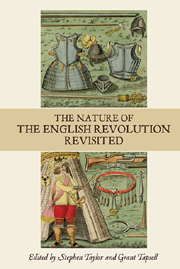Book contents
- Frontmatter
- Contents
- Preface and Acknowledgements
- List of contributors
- List of Abbreviations
- 1 Charles I and Public Opinion on the Eve of the English Civil War
- 2 Rethinking Moderation in the English Revolution: The Case of An Apologeticall Narration
- 3 The Parish and the Poor in the English Revolution
- 4 Body Politics in the English Revolution
- 5 The franchise Debate Revisited: The Levellers and the Army
- 6 Oliver Cromwell and the Instrument of government
- 7 ‘de te fabula narratur’: The Narrative Constitutionalism of James Harrington's Oceana
- 8 Democracy in 1659: Harrington and the Good Old Cause
- 9 The Restoration of the Church of England, 1660–1662: Ordination, Re-ordination and Conformity
- 10 Style, Wit and Religion in Restoration England
- 11 A British Patriarchy? Ecclesiastical Imperialism under the Later Stuarts
- Index
- Studies in Early Modern Cultural, Political and Social History
7 - ‘de te fabula narratur’: The Narrative Constitutionalism of James Harrington's Oceana
Published online by Cambridge University Press: 05 July 2013
- Frontmatter
- Contents
- Preface and Acknowledgements
- List of contributors
- List of Abbreviations
- 1 Charles I and Public Opinion on the Eve of the English Civil War
- 2 Rethinking Moderation in the English Revolution: The Case of An Apologeticall Narration
- 3 The Parish and the Poor in the English Revolution
- 4 Body Politics in the English Revolution
- 5 The franchise Debate Revisited: The Levellers and the Army
- 6 Oliver Cromwell and the Instrument of government
- 7 ‘de te fabula narratur’: The Narrative Constitutionalism of James Harrington's Oceana
- 8 Democracy in 1659: Harrington and the Good Old Cause
- 9 The Restoration of the Church of England, 1660–1662: Ordination, Re-ordination and Conformity
- 10 Style, Wit and Religion in Restoration England
- 11 A British Patriarchy? Ecclesiastical Imperialism under the Later Stuarts
- Index
- Studies in Early Modern Cultural, Political and Social History
Summary
While the importance of James Harrington's Oceana is generally acknowledged, its meaning and intention, status and context have been the subject of three major controversies in the last sixty years. The first of these was about the work's linking of property and power and the meaning of Harrington's attempt to stabilise the relationship between them through an Agrarian Law. The second concerned the nature and sources of his republicanism. The third relates to the ambiguity of the work's dedication to Oliver Cromwell. Was Harrington sceptical or optimistic in relation to the lord protector's ability to act in the public interest, without personal ambition? These issues have overshadowed the significance of Oceana's subtitle citation of Horace - ‘de te Fabula narratur. That epigraph suggested a number of things, one of which was that narrative was to be critical to the work's form, intention and audience. The ‘te’ - the audience - whom it addresses embraced not only the lord protector but also mutually antagonistic English, Irish and Scottish political, military and religious groups as well as heads of households, office-holders and taxpayers at parish, hundred, county and Britannic levels, the victors, the defeated and the neuters in Britain's civil wars.
- Type
- Chapter
- Information
- The Nature of the English Revolution Revisited , pp. 151 - 174Publisher: Boydell & BrewerPrint publication year: 2013

